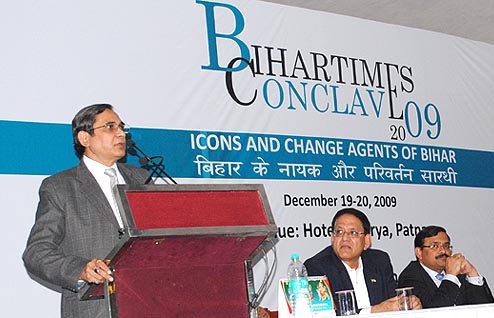|
|
Patna,(BiharTimes): The Centre on Wednesday selected former Chief Secretary of Bihar, Navin Kumar, as the Chairman of GSTN. It is a special purpose vehicle (SPV) for providing common IT infrastructure to the Centre and the states in the Goods & Services Tax (GST) regime.
|
 The selection committee was headed by Finance Minister P Chidambaram. It chose Navin Kumar from a list of six people, including three more IAS officers and two Indian Revenue Service officers. The committee comprised Unique Identification Authority Chairman Nandan Nilekani and chairman of Empowered Committee of State Finance Ministers Sushil Kumar Modi, who is also the deputy chief minister of Bihar. The selection committee was headed by Finance Minister P Chidambaram. It chose Navin Kumar from a list of six people, including three more IAS officers and two Indian Revenue Service officers. The committee comprised Unique Identification Authority Chairman Nandan Nilekani and chairman of Empowered Committee of State Finance Ministers Sushil Kumar Modi, who is also the deputy chief minister of Bihar.
Navin Kumar is a 1975 batch IAS officer. He may be appointed for a period of three years or till the time of attaining 65 years of age, whichever is earlier. He retired in August 2012.
Reports from Delhi said that others in the race for the post were P K Basu, a 1976 batch IAS officer of Bihar cadre; M M Srivastava, a 1978 batch officer of Gujarat cadre, K Jose Cyriac, a 1977 batch officer of Kerala cadre, and former Central Board of Excise & Customs members J K Batra and Y G Parande.
“Setting up GSTN will give a big boost to implementation of GST. It will work as an interface for Value Added Tax also,” Modi was quoted in Business Standard.
The SPV would be incorporated as a not-for-profit company in which the government will retain strategic control. It would have an equity capital of Rs 10 crore. Both the Centre and the states will have a stake of 24.5 per cent each in the SPV, while NSDL will have up to 21 per cent. Three financial institutions will get stake of 10 per cent each. It will have a self-sustaining revenue model based on levy of user charges on tax payers and tax authorities availing its services.
Reports said that GSTN is expected to help improve interface among tax payers, tax administrators and banks. Pilot projects are going on in 11 states with
NSDL as the technology partner. Representatives of various tax
authorities, test users from banking industry and trade diasporas are involved in an objective testing phase. Prototypes of probable models of key business processes namely registration, return filing and payment of taxes are developed.
| 